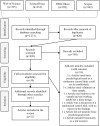Basic Psychological Needs in the Work Context: A Systematic Literature Review of Diary Studies
- PMID: 34733198
- PMCID: PMC8558380
- DOI: 10.3389/fpsyg.2021.698526
Basic Psychological Needs in the Work Context: A Systematic Literature Review of Diary Studies
Abstract
According to the self-determination theory, individuals' basic psychological needs for autonomy, competence, and relatedness should be satisfied for optimal psychological growth. The satisfaction of these needs seems to vary due to changes in a person's social context, and the outcomes of the satisfaction of these needs also vary along with the needs. Despite several studies investigating daily and weekly variations in need satisfaction and its correlates, no systematic investigation exists. This study aimed to conduct a narrative synthesis of existing quantitative diary studies of basic psychological needs in the work context. We specifically aimed to evaluate if psychological need satisfaction varies daily and weekly and judge whether they vary more daily or weekly. Additionally, we also aimed to review the literature regarding the relations between daily or weekly variations in need satisfaction and its assumed antecedents and outcomes. We included peer-reviewed articles in English that measured work-related basic psychological needs using a quantitative diary study design. Database searching (Web of Science, ScienceDirect, EBSCOhost, and Scopus) led to the extraction of 2 251 records by February 2020. Duplicates were removed, the remaining records were screened (n = 820), and 30 articles were assessed using eligibility criteria. Two authors individually conducted the screening and eligibility processes to manage selection bias. In total, 21 articles were included in the final review. The review indicated that basic psychological need satisfaction showed considerable within-person variation and was more dynamic daily (compared to weekly). Job demands, job resources, organisational resources, and individual characteristics appeared to associate with these variations. The organisational context seemed to matter the most for need satisfaction. Variations in need satisfaction were also related to employee well-being, performance, and motivation. Despite the small number of published studies (particularly for weekly studies), our results indicate that researchers should pay attention to within-person variations in need satisfaction. Measuring daily need satisfaction could be prioritised. Different antecedents and outcomes seem to be associated with different needs. Thus, when needs are viewed as distinct constructs instead of unidimensional ones, one can derive greater insights. The study is funded by the National Research Foundation.
Keywords: autonomy; basic psychological needs; competence; diary studies; relatedness; self-determination theory; systematic review.
Copyright © 2021 Coxen, van der Vaart, Van den Broeck and Rothmann.
Conflict of interest statement
The authors declare that the research was conducted in the absence of any commercial or financial relationships that could be construed as a potential conflict of interest.
References
-
- Albrecht S. L. (2015). Challenge demands, hindrance demands, and psychological need satisfaction: their influence on employee engagement and emotional exhaustion. J. Pers. Psychol. 14, 70–79. 10.1027/1866-5888/a000122 - DOI
-
- *. Aldrup K., Klusmann U., Lüdtke O. (2017). Does basic need satisfaction mediate the link between stress exposure and well-being? A diary study among beginning teachers. Learn. Instruct. 50, 21–30. 10.1016/j.learninstruc.2016.11.005 - DOI
-
- Bakker A. B., Bal M. P. (2010). Weekly work engagement and performance: a study among starting teachers. J. Occup. Organ. Psychol. 83, 189–206. 10.1348/096317909X402596 - DOI
-
- *. Bakker A. B., Oerlemans W. G. M. (2019). Daily job crafting and momentary work engagement: a self-determination and self-regulation perspective. J. Vocat. Behav. 112, 417–430. 10.1016/j.jvb.2018.12.005 - DOI
Publication types
LinkOut - more resources
Full Text Sources


